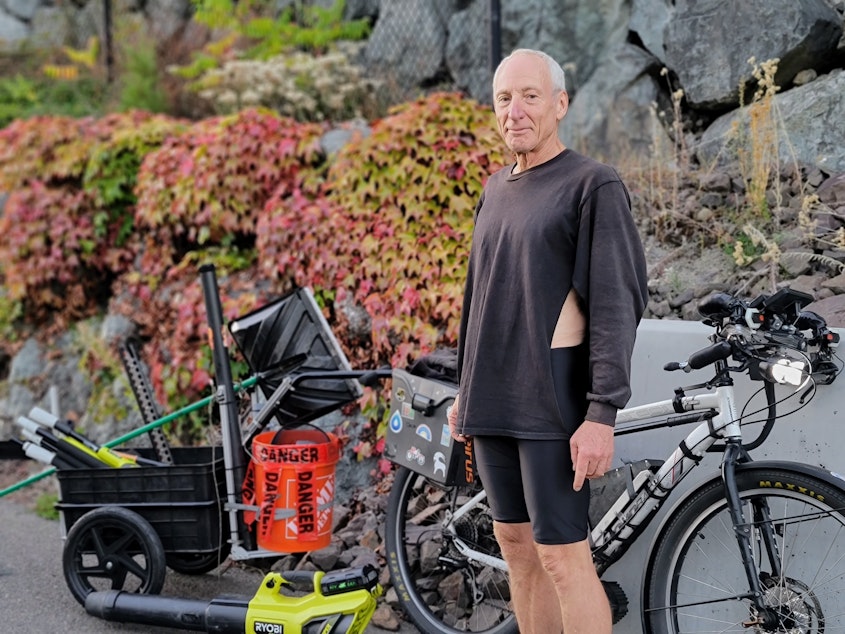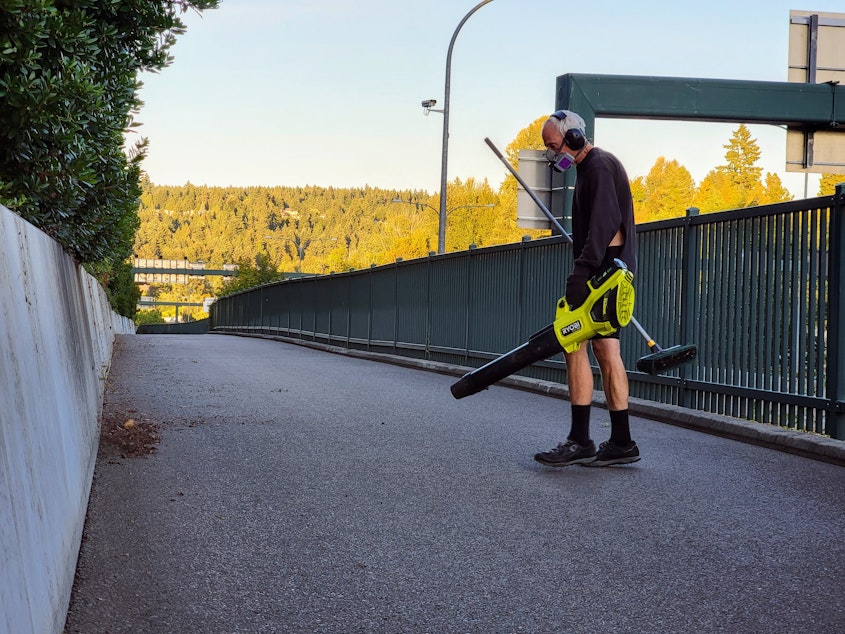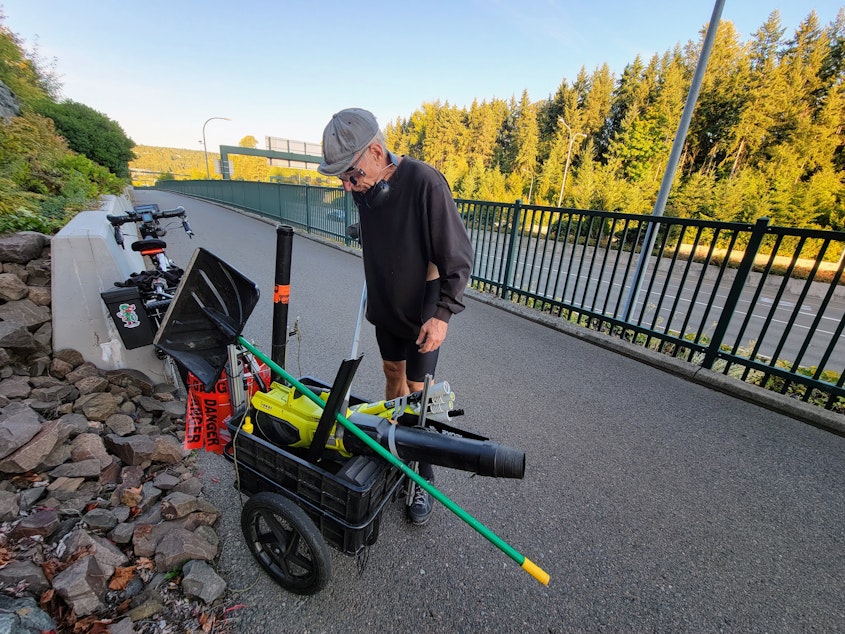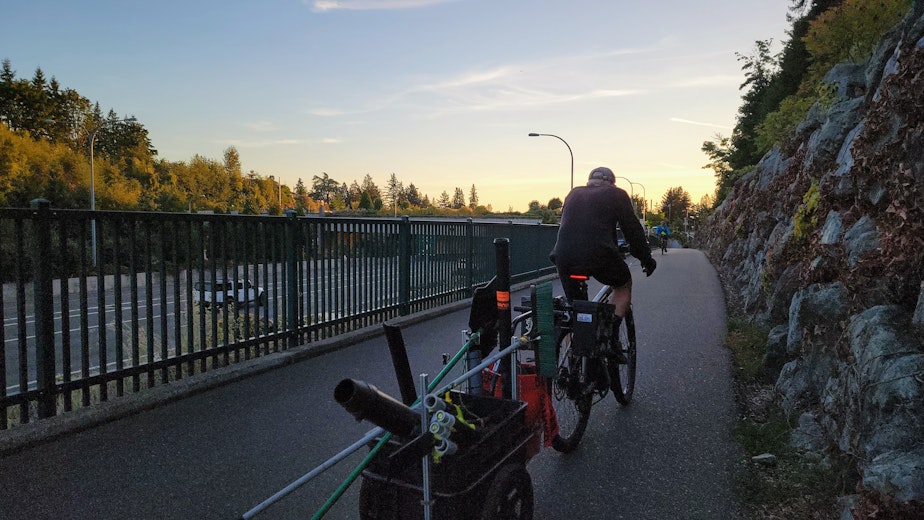Meet the guerilla gardener of Seattle's 520 bike path

The rain has returned to the Seattle area, leaves are falling, and that means bike paths are getting clogged up with debris. On the State Route 520 bike path, one man has made it his mission to keep the busy trail clear and safe.
It’s a little after 6 o’clock on a weekday and bike commuters are riding home across the 520 floating bridge bike trail. The path runs parallel to the highway that connects Seattle to the Eastside across Lake Washington.
As bicyclists and scooters make their way across the floating bridge and into Kirkland, one man is not enjoying his evening bike ride.
Instead, he’s cutting back vines with an electric hedge trimmer way above his head. Meet 67-year-old mechanical engineer Lee Zuhars.
“I have to watch out because I don't want to trip other cyclists,” Zuhars said. "People aren't ready for somebody cleaning on the trail. I put my bucket out sometimes, my warning bucket.”
Zuhars doesn’t work for Washington state, which owns this trail. And he doesn’t live in one of the houses nearby.
Sponsored
Nope, Zuhars is a bike commuter. He rides his e-bike on this trail every day.

A few years ago he started noticing that all kinds of stuff gets onto this trail: fallen leaves, tree branches, even broken glass from car wrecks.
“It doesn't look like much, but to a bicycle it's a lot,” Zuhars said.
His worst nemesis: “Blackberry. There's other ones that I do have to take care of back by the underpass and their vines are like half inch,” he points down toward Hunts Point, “that's gonna come out.”
Sponsored
Zuhars works quickly and doesn’t stop pulling weeds and trimming vines. Other bicyclists go by and give him a look like, "What’s that guy doing?"
Asked if any other cyclists have pulled over to give him a hand, Zuhars said, “Well, they try, but it doesn't work out because they're kind of in biking clothes that, you know, they don't want to mess up their clothes. This is a dirty, sweaty job.”
When he first started cleaning the path, Zuhars brought a broom and some loppers. Since then, he’s gone electric.
“Got the leaf blower, the pole hedger, and the pole chainsaw,” he said.
He’s also got a snow shovel, a push broom, a respirator, and eye protection. And he carries all of these tools in a trailer behind his customized mountain e-bike. He’s like a one-man gardening center on wheels.
Sponsored

Zuhars does this because he’s tried contacting the state about the dirty path but hasn’t heard much back.
“Don't ask to do it,” he said. “Ask for forgiveness if they don't like it.”
Sponsored
But the state doesn’t want Zuhars to stop. They think he’s doing great work.
“It takes a village to take care of things sometimes,” said Steve Peer, media manager for the Washington Department of Transportation, “and so we love it when people stop and pick things up. We're not asking them to.”
Peer said state officials do use a street sweeper, named Broom Hilda, that fits in the 14-foot-wide bike trail.
It gets sent out about once a month, he said. And in between those times, Peer said it helps to have people like Zuhars pitch in.
“It's hard to stay on top of it with all the other maintenance that we have not just on the trail but all around the Northwest region,” Peers said. “There's just a lot going on. So we appreciate if people can do that safely. That sounds ideal for someone to come out and help us like that.”
Sponsored
But not everyone thinks Zuhars should be pulling out his electric hedge trimmer just to bike to work.
Paul Tolmé is with the Cascade Bicycle Club, an advocacy group in Seattle.
“It's not the best way,” Tolmé said. “The onus should fall on the municipal leaders as well as state leaders to invest in keeping our bike lanes clean.”
Tolmé said during this time of year, bike paths can become dangerous for bicyclists and prevent new riders from getting out of their cars and onto bikes.
“The rains come, knock all the leaves down onto the roads, and they gather on the sides of the streets and then the bike lanes,” he said, “and they create a real slimy, slippery mess which actually can be quite hazardous, almost like riding through snow.”
Cascade organizes bike path cleanups around Seattle similar to what Zuhars is doing. Two are coming up in November, one on Wednesday, Nov. 8 and the other on Sunday, Nov. 11.
“We can't do the entire city of Seattle, but we do what we can,” Tolmé said.
Steve Peer from WSDOT said he’d like to partner with Zuhars, maybe work with him, and definitely thank him for all his hard work.
Zuhars’ partner, Leslie Taylor, said she hopes he doesn’t have to keep doing this after work.
“I worry about him a little bit in the dark because I know there's a lot of cars around there,” she said. “I mean I think it's a great thing he's doing it, I think he should be lauded from the rooftops for doing it, and that WSDOT should certainly tip their cap. That'd be great.”
Zuhars said he’s not looking for any thanks. He just doesn’t want to get a flat in the middle of the bridge on a cold, rainy morning.
“I’ll get an occasional thank you,” he said as he packed up his yard tools into the trailer. “It's kind of nice that that happens. I'm glad that you can benefit from this, but I'm mostly doing it for me.”
He did say he wouldn’t mind if the state installed a job box near the bridge so he doesn’t have to lug around all those tools behind his bike.
As the sun had already set, Zuhars climbed aboard his bike with his trailer behind him and pedaled home. Other cyclists passed him on the now pristine trail, clear of dead leaves and dreaded blackberry vines.





